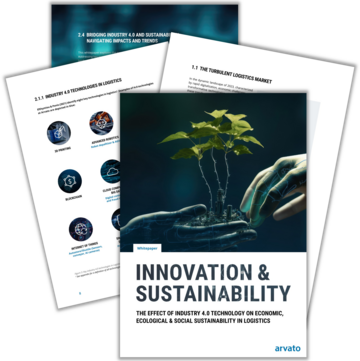Whitepaper Innovation and Sustainability
New study on the impact of Industry 4.0 technology on sustainability in logistics

THE EFFECT OF INDUSTRY 4.0 TECHNOLOGY ON ECONOMIC, ECOLOGICAL & SOCIAL SUSTAINABILITY IN LOGISTICS

Logistic service providers (LSP) are pressured to deliver order fulfillment services while at the same time working towards more sustainable business conduct while minimizing negative impact. LSPs are hopeful that the use of innovative technologies will enable them to meet the demands of the dynamic industry, but they remain uncertain about the actual impact. Rising awareness and pressure around sustainability in (global) supply chains from governments, clients, and consumers force logistic providers to rethink their value chains and move away from a purely economic business model to a more balanced strategy for pursuing sustainability, including social and environmental issues.
The Fourth Industrial Revolution (Industry 4.0) emphasizes digitalization, automation-, and analytics technologies, such as Cyber-Physical Systems, the Internet of Things (IoT), Big Data, Artificial intelligence (AI), and Augmented Reality. In downstream areas of supply chains such as warehouse and order fulfillment, technologies like automated storage and retrieval, robot-piece picking, or AI vision can overcome challenges such as higher customer expectations, next-day delivery, order tracking, increased (network) collaboration, agile pricing, and service quality.
The whitepaper Innovation & Sustainability - The effect of Industry 4.0 technology on sustainability in logistics deals with the correlation of innovative technologies and sustainability strategies in logistics. Interviews with innovation and sustainability practitioners from Arvato were conducted to further examine the role of Industry 4.0 technologies (I4.T0) on the sustainability of LSP and gain insights into implemented projects. The author is our colleague Karoline Kowalik, Logistics Engineer and PhD student in the field of Innovation and Sustainability at Maastricht University.
I4.0T presents challenges in developing a holistic corporate strategy for sustainability. While it offers economic benefits like cost reduction and process optimization, its environmental impact varies and requires careful assessment. On the social front, embracing I4.0T can enhance brand image and workplace conditions. Understanding its total impact is essential for evaluating its true value.
If you are interested in this topic and the impact of industry 4.0 technologies on sustainability in logistics, you can read the full whitepaper here: